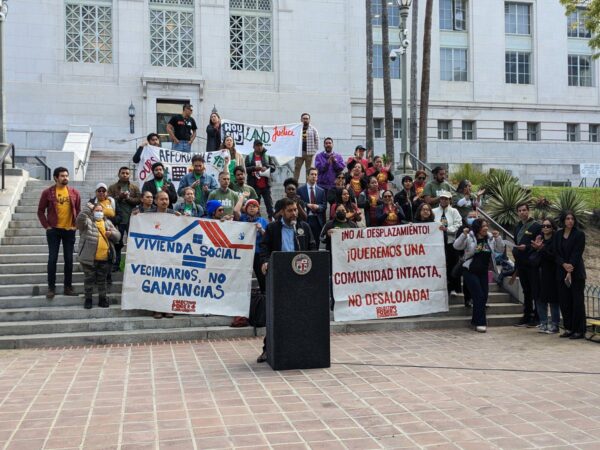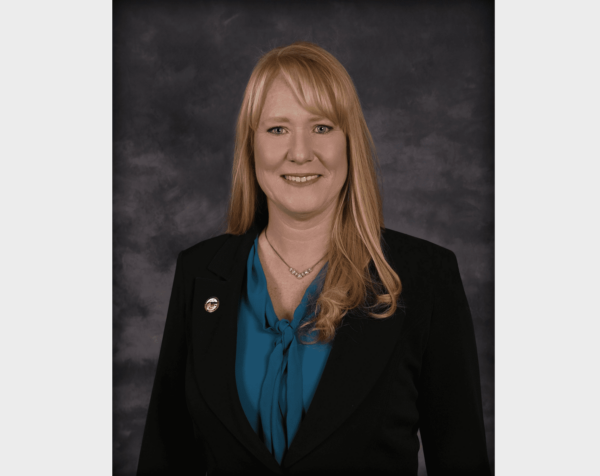Renters and other advocates rallied Wednesday outside Los Angeles City Hall, filling the south lawn, to demand the City Council create “social housing” as part of a slate of solutions to address the city’s affordability and homelessness crisis.
The Alliance for Community Transit-LA, a coalition of 43 organizations calling for housing and transit justice in Los Angeles County, organized the morning event, which included remarks from council members Eunisses Hernandez, Hugo Soto-Martínez and Nithya Raman. ACT-LA called on the city to prioritize social housing, saying it can provide tenants with a pathway to homeownership by allowing them to make affordable payments over a reasonable period of time.
“We see and live through the consequences of real estate corporations controlling Los Angeles’ housing market everyday,” said Eva Garcia, a renter and community leader. “Homes are so unaffordable that so many people have given up being able to afford a permanent home.
“And for the majority who have to rent, they face the daily struggle of worrying about being pushed out of their homes, or rents increasing and suddenly being unable to afford their home. This all feeds into our homelessness crisis.”
According to ACT-LA, social housing, run by nonprofits and residents, is designed to keep rents affordable while also providing tenants with the training and authority to manage their own buildings.
“Over 70% of tenants in L.A. are rent-burdened and almost half of tenants spend over 50% of their income on rent,” Soto-Martínez said in a statement. “By building social housing, which is publicly funded and permanently affordable, we can start taking the profit motive out of housing to benefit the working people of Los Angeles instead of billionaire Wall St. developers.”
Under social housing, the city would provide city-owned property or lease existing buildings to community-led organizations to develop and manage housing directly.
“We, like the majority of those across Los Angeles, want to see housing affordability and (the) homelessness crisis addressed immediately,” said Roberto Garcia-Ceballos, the co-director of Fideicomiso Comunitario Tierra Libre, a Boyle Heights and East LA community land trust, which has created community-controlled housing options.
“But that means investing in permanent housing solutions outside of corporate control, so that residents can work together — instead of depending on corporate landlords whose only goal is maximizing profit,” he added.
ACT-LA members also expressed their support for Measure ULA, which was passed by voters in November and enacted a 4% tax on properties sold or transferred for more than $5 million and a 5.5% tax on properties sold or transferred for more than $10 million. Revenue from the measure would fund housing availability and homelessness prevention.
City officials estimate a total of $672 million would be generated by the measure. However, the measure is currently facing litigation by the Howard Jarvis Taxpayers Association and the Apartment Association of Greater Los Angeles.
The lawsuit seeks to prevent the city from implementing Measure ULA.
“What people need to think about is that, what they like to call the `mansion tax,’ impacts all types of property — multi-family, office buildings, and not just mansions,” Daniel Yukelson, executive director of the Apartment Association of Greater Los Angeles, told City News Service earlier this month.
“Quite frankly, it’s a big tax bill, 5.5%, and it’s really going to discourage development in the city of Los Angeles,” he added.
Mayor Karen Bass announced Tuesday during her proposed city budget for the 2023-24 fiscal year that she would use $150 million of revenue generated from Measure ULA to support efforts to address homelessness, affordable housing and tenant protections.
Bass said the Federal Emergency Management Agency would backfill that money in the event that the measure remains challenged in the courts.
“Angelenos across the city worked tirelessly to pass Measure ULA last November to create permanent housing solutions, including funding for social housing,” Carla De Paz, an organizer with the organization Community Power Collective, said in a statement. “But until our elected leaders take action, it will remain an unfulfilled vision rather than opportunity for housing to enrich our communities.”
Updated April 19, 2023, 11:48 a.m.







